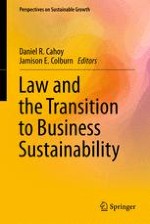2014 | OriginalPaper | Buchkapitel
4. Subsidizing Sustainability: The Role of the State and Civil Society in Implementing Wal-Mart’s Local Produce Sourcing Program
verfasst von : J. Dara Bloom
Erschienen in: Law and the Transition to Business Sustainability
Aktivieren Sie unsere intelligente Suche, um passende Fachinhalte oder Patente zu finden.
Wählen Sie Textabschnitte aus um mit Künstlicher Intelligenz passenden Patente zu finden. powered by
Markieren Sie Textabschnitte, um KI-gestützt weitere passende Inhalte zu finden. powered by
